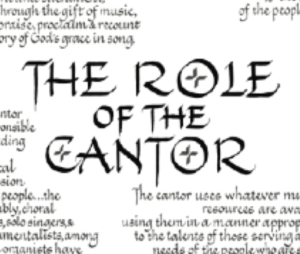Today’s post is by Scott Weidler, outgoing Program Director for Worship and Music in the ELCA. An excerpt from an article written for CrossAccent, the journal of the Association of Lutheran Church Musicians, it addresses the ELCA’s unification of diaconal rosters which was later approved at the 2016 Churchwide Assembly.
How, Weidler asks, does the concept of deacon as a minister of word and service fit with the vocational self-understanding of Lutheran church musicians?
Ministers of Word and Service
Clearly, the phrase “ministers of word and service” is parallel to the common descriptor of pastors as “ministers of word and sacrament.” While some musicians have had a hard time trying to understand how they fit on this roster, the benefit of positioning the ministries included on this new roster, including music, side by side with the Word and Sacrament roster in the ELCA constitution is significant.
Since “word” is also a part of the pastor’s description, our minds go immediately to preaching which is, of course, a significant part of a pastor’s call. For some deacons, preaching may also be a part of their ministry. However, I believe that Lutherans—perhaps more than any other Christian tradition—ought to easily understand musicians as among those who proclaim the word through song. Musicians proclaim God’s word regularly by leading congregational hymns and songs, directing the choir and instrumentalists, and often through teaching and perhaps, in some settings, an occasional sermon.
The “service” half of the phrase is usually further articulated as “service to the world.” Certainly, ministries of justice—like feeding the hungry and raising up the poor—are at the heart of a biblical understanding of diakonia, being a deacon. This focus on ministries in the world, beyond the walls of the church, are an important aspect of this newly emerging roster, just as it should be for all the baptized. Anyone serving in the church (including musicians, rostered or not) will, at their best, understand that their unique ministry has connections to service in the world.
This can, however, start to feel a little distant from our actual work. A document that supports this proposed change includes this statement:
it also includes service in local congregational and other gathered faith community settings through the proclamation of the Word in preaching, leading public prayer, teaching, and leading music as well as through leadership in such areas as education, administration, and youth ministry.
The connections between worship and service are clear in our Lutheran roots, especially through the German word for worship, Gottes- dienst (literally “service of God”), which connotes a multidirectional understanding of service from God to the worshippers, from the worshipers to God, and from the assembly of worshippers to the world.
The ALCM statement on the role of the cantor also affirms this broad understanding of the musician’s ministry: “The cantor’s work is a worthy service to God, God’s people, and the world.” I believe musicians can rightly understand their work as service to the church for the sake of the world.
The full article can be found on the ALCM web site.

